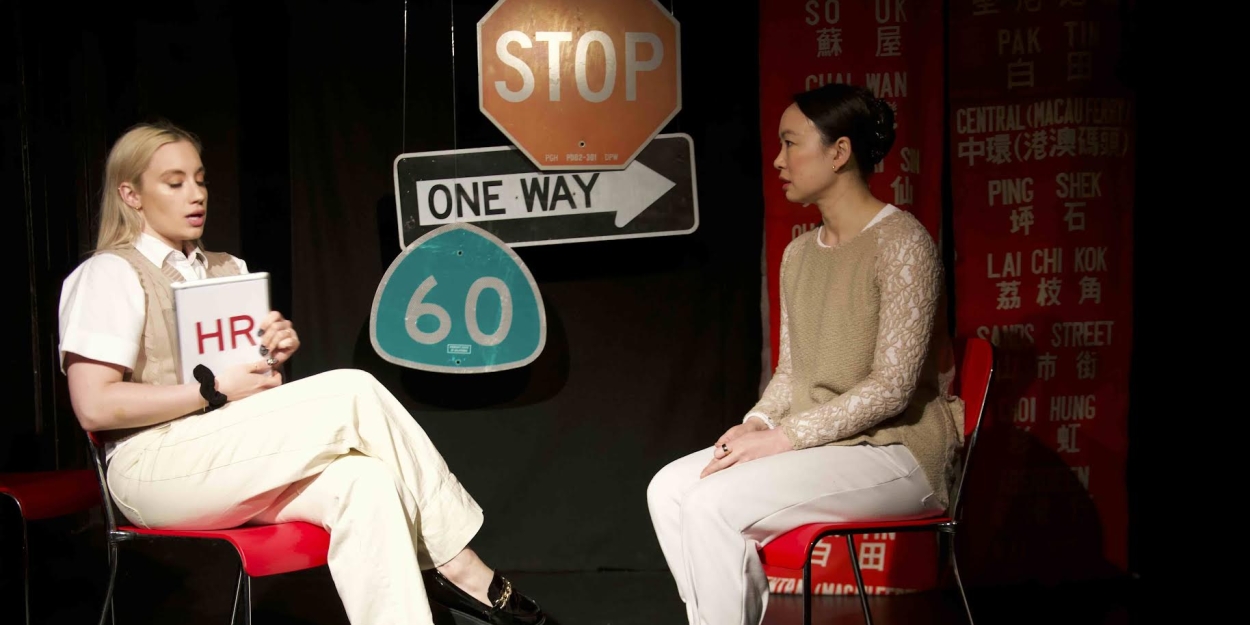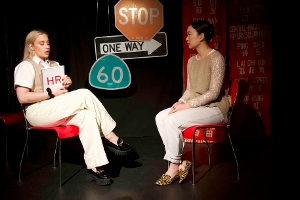Interview: EXPATRIATED co-writers & performers Dominique Roberts & Candace Leung
On their new play about Migration at Broadwater Second Stage during the Hollywood Fringe Festival


Produced by Klutzy Dragon and Paper Starship Studios, Expatriated is a poignant new play written and performed by Dominique Roberts and Candace Leung that explores contrasting experiences of migration, centered around the stories of an LA lawyer who finds herself in the vibrant city of Hong Kong, while on the other side of the world a Hong Kong lawyer faces the crushing reality of starting a new life in Los Angeles. It examines why some people are called “expats” while others are labeled as “immigrants” when they leave their home country seeking new horizons, and the uncertainty, privilege, and injustice they face along the way.
I decided to speak with Dominique and Candace about the decision to create the play, how it reflects their own experiences, their experience presenting it before and at the Hollywood Fringe Festival, and what plans they have for its future.
Thank you both for taking time out of your busy schedule to speak with me, especially with your play opening so soon. First, how did the two of you first meet?
 Dominique (pictured): We met in London, through a mutual singing teacher!
Dominique (pictured): We met in London, through a mutual singing teacher!
Are you both native-born American citizens? Or do you hold dual citizenships?
Dominique: I am a US citizen, but I have lived in the UK for almost a decade. I have also lived in Hong Kong.
Candace: I am a US citizen too and I have a lot of family in Hong Kong.
What inspired you to write and perform the play together?
Dominique: I first had the idea to explore societal use of the terms “immigrant” vs. “expat” after comparing my own migration experience (from the US to the UK and to Hong Kong) with the experiences of my law school classmates. I wondered why, although I was also living abroad, I did not seem to be labeled an ‘immigrant’ in the same sense the word is often used in divisive politics. I previously worked as a lawyer in Hong Kong so I personally experienced a lot of the themes we explore in the play.
 Candace (pictured): I come from a family of immigrants from Hong Kong so I spent a lot of time growing up here in California but also a lot of summers in Hong Kong, visiting family and goofing off with cousins. I got to see, first-hand, the dynamic of expats there and their interaction with locals. Being able to speak like a local but also like an American allows me to move fluidly among different groups of people there and make observations about the different social dynamics at play.
Candace (pictured): I come from a family of immigrants from Hong Kong so I spent a lot of time growing up here in California but also a lot of summers in Hong Kong, visiting family and goofing off with cousins. I got to see, first-hand, the dynamic of expats there and their interaction with locals. Being able to speak like a local but also like an American allows me to move fluidly among different groups of people there and make observations about the different social dynamics at play.
Absolutely. That is certainly true about both sides of my family who immigrated here in the early 20th Century. In doing research I was amazed at the variety of career paths you followed during your education. In what ways do you think your training as an actor, in finance, and as a lawyer have inspired you to become a playwright?
Candace: I think my diverse experience in finance and law gave me personal experiences to draw from to write characters that ring true. I essentially received an open invite to be a fly on the wall and observe the different stories of the real people in those environments. I didn’t necessarily know that’s what I was doing then, but it became extremely valuable when we were writing this play. As an actor, I really like to see the arc of a story, of a character’s development. The ability to look for those aspects really helped in writing this play!
Dominique: I find my eclectic background has not only inspired me to be a writer, but has also made this possible. Having law degrees in both the UK and the US as well as a master’s in history has opened new worlds of stories to tell, and given me tools to reach broader audiences. I tend to write a lot of historically based work, including Expatriated which is, at its core, a narrative about the systematic biases embedded in post-colonial social structures. Of course, my background working as a finance lawyer in Hong Kong was helpful when writing this show, but I am not sure I would have been able to write this piece without also having a background as a historian and therefore the ability to step out of my own life to make more objective observations. My theater degree and experience as an actor helps me to better visualize the eventual execution of the play, which helps me write scenes that will translate off the page and be effective on the stage.
How about your work experience?
Candace: Working in finance companies and law firms in the United States, I noticed that many of my own uncomfortable experiences involving racial or cultural dynamics dovetailed with stories about disparate treatment that I heard from other Asian women including colleagues, friends, and family in these professions. These might include, for example, lesser availability of opportunities, more critical evaluation and assessment criteria at work, or misunderstanding or blindness to cultural differences. This seemed to happen even when we couldn’t be classified as anything else but native Californian and American.

Dominique Roberts and Candace Leung in Expatriated. Photo credit: Liam Doyle
Did you write the play to address how unfair it is to be labeled as anything other than American?
Candace: We’re labeled “immigrant” and “other,” and almost never “expat.” All of these things can be so subtle you might miss them happening in everyday life. I don’t want those things to be brushed off anymore. And this play seemed to be the time and place to shine some light to these very real experiences.
What connotations or stereotypes do you think are associated with the terms “immigrant” and “expat”? And why is one more negative than the other?
Dominique: I recognize that there are academic arguments to differentiate these terms based on factors like length of stay or the intention to permanently domicile, but in practice I think the use cases for these terms are unfortunately very clear. “Expat” is frequently colloquially used to describe white people, often from the US, UK, Canada or Australia, living abroad. In contemporary English, “Immigrant” is usually used to describe migrants, whose first language is often not English, moving to developed western economies. The word “immigrant” also carries a connotation of hardship that migrants from positions of privilege (such as white, English-speaking migrants from developed western economies) experience less. By contrast, the term “expat” is more likely to be associated with connotations of wealth and social privilege. These distinctions are definitely reflected in Expatriated.
What do you hope audiences take away from the performance?
Dominique: I hope our play inspires audiences to reflect on when and how they use terms like “immigrant” in their own daily lives, and if they subconsciously associate certain terms with specific groups of people. I also hope our show inspires audience members to be extra kind the next time they interact with someone who might have an accent, or who may have recently moved to the US from elsewhere.
Candace: For me, it’s often easy to walk away from an uncomfortable situation and wonder why someone uttered a racist comment or denigrated your work because the writing in English wasn’t good enough for them. It’s a broader issue when you start hearing stories of other multilingual women (and others who don’t quite fit the traditional profile of these law firms) having similar experiences. And it’s really difficult to “tell” people the pain we might feel. So maybe, just maybe, an audience member might imagine or have the chance to consider how they might feel if they were in our shoes.

Candace Leung and Dominique Roberts in Expatriated. Photo credit: Liam Doyle
Your play takes place in both LA and Hong Kong. How did you approach telling a story across two such different landscapes on the same stage?
Dominique: Our set is extremely simple and the play only features two characters (Immigrant and Expat), so we needed to find creative ways to create two distinct worlds using sound. Our incredible sound designer, Sharon Tsang, is from Hong Kong and so she understood the unique soundscape of Hong Kong and how to clearly differentiate this from the city sounds of LA. Even people who have never been to Hong Kong (and might not recognize the iconic crosswalk sound) will clearly be able to hear the difference and feel truly immersed in two separate, but equally engaging worlds.
No doubt language barriers create unnecessary and often unfair assumptions about those working, living or just visiting other countries. Is that reflected in Expatriated?
Dominique: Absolutely! Our show uses several languages to create a unique experience for the audience of feeling included in the story but also excluded from the conversation at times. We thought this use of language to both engage and alienate the audience was critical to more authentically portray the experience of migration.
Is the play suited for audiences of all ages?
Candace: This show is for everyone! Not only because it is fast-paced and humorous, but also because we all interact with immigrants in daily life so we can all benefit from a chance to reflect on our own bias, acknowledged or not.
Where has the play been presented before? And what led to it being done there?
Dominique: Our first run was in London, because that is where Candace and I both live! The UK is also an interesting place to perform Expatriated given Britain’s historical colonial relationship with Hong Kong. However, half the play takes place in LA and many of the themes are specific to the experience of migrants in the US, so we are really eager to get feedback from LA theatre goers!
Where do you plan to take your play after Fringe?
Candace: We plan to continue developing Expatriated based on feedback from LA audiences.
Before I let you go, Dominique, tell me what led you to create Paper Starship Studios, a co-producing company of Expatriated? And is this the first play the company has produced?
Dominique: I run the production company Paper Starship Studios with my sister, Gabrielle Roberts, and the majority of our work has actually been in film. We have ventured into theatre very recently to produce Expatriated and the London premier of a new femme-forward musical called Songs for Slutty Girls. All our projects, stage or screen, seek to empower women. Our last film was a historical drama about the woman who wrote the code for the Apollo missions, and our next film is sponsored by M&Ms in partnership with the Geena Davis Institute on Gender in Media.
Anything else you’d like to add about yourselves or Expatriated?
Dominique: This is a show about substantive themes but it is presented in a fast-paced and lighthearted format.
Thanks so much!
# # # #
Expatriated, co-written & performed by Dominique Roberts and Candace Leung, is produced by Klutzy Dragon and Paper Starship Studios in its North American premiere during the Hollywood Fringe Festival. Performances take place Sat. June 22, 5:30 PM | Sun. June 23, 6:30 PM | Tue. June 25, 9:30 PM at Broadwater (Second Stage), 6320 Santa Monica Blvd., Los Angeles, CA. 90038. Running time: 55 minutes. General admission $18. Tickets in advance at https://www.hollywoodfringe.org/projects/10891 or at the theater based on availability.
Comments
Videos

